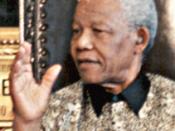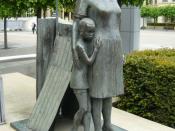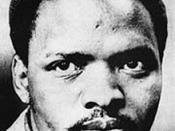Between the start of apartheid in the early 1950's and the end of it in the early 1990's, thousands of black native Africans and coloureds suffered at the hands of Nationalist followers and government policies. They were constantly undermined, tortured, discriminated against and suppressed. When it finally reached an end, the South African economy was suffering and millions of people were living in perpetual poverty. However, over the years there were many opposition movements against apartheid and Nationalist rule which the government tried consistently to destroy.
One of the first rebellion movements was in 1995 in Sophiatown, a black township; the inhabitants were told that they had to move out and opposition was enormous. They tried non violent methods but the white police force simply over powered them and destroyed Sophiatown completely. However after this, many organizations were set up to fight against apartheid, the ANC being one of the main ones.
In 1950 they organized a 'freedom day' strike, but the government battled this by passing yet another act, the Suppression of Communism Act. This could ban anyone from attending public meetings, made it illegal to oppose white supremacy and gave the government almost complete power against its opponents- a huge barrier for opposition. After the Sharpeville incident, Nationalists tightened law enforcement, closed down the PAC and ANC (although they continued working secretly for years after) and sent thousands of opposers to jail, including Nelson Mandela. It seemed that every time an act was done against apartheid, the ones behind it were persecuted and laws were tightened. When a student organization, SASO, was set up, its leader Steve Biko was murdered, the organization was banned and many followers were sent to jail. In 1976, after the disastrous Soweto incident, Vorster gained his largest ever election victory and passed...


